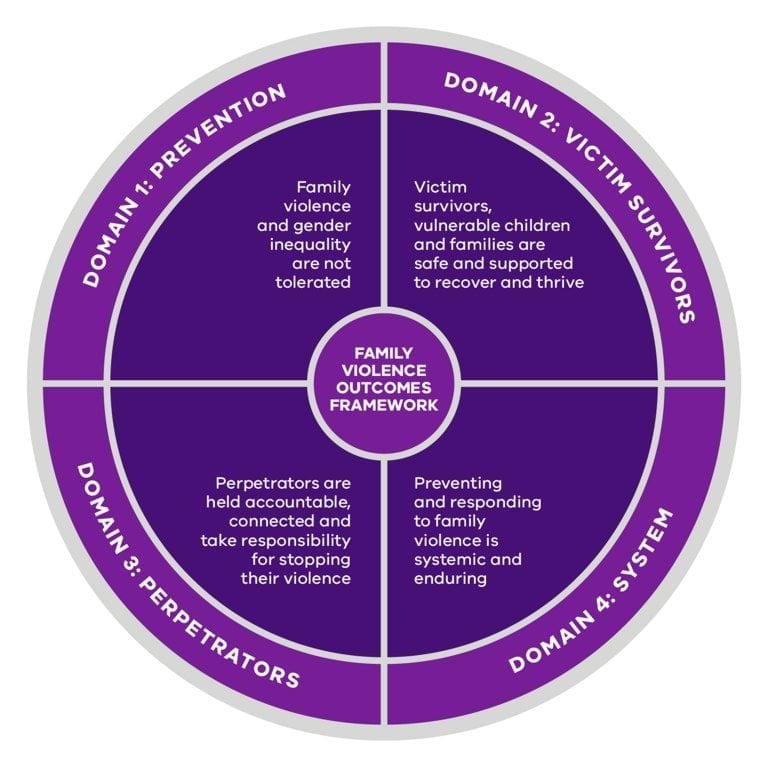
This is the second of the 3 rolling action plans to guide delivery of our 10-year plan to build a Victoria free from family violence.
During the first phase we began to roll out the foundational reform projects and programs and established two new agencies to strengthen primary prevention and response: Respect Victoria and Family Safety Victoria.
We are seeing the system come together. Over the next 3 years we will continue our planned expansion of programs and projects and delivery of the activities outlined in this second rolling action plan.

Around a quarter of the 227 Royal Commission recommendations remain in progress.
We will increasingly use the Family Violence Outcomes Framework as the organising framework of the reform.
Our focus is to show a clear picture of an integrated set of activities for each priority, how they connect to other reform activity – and how their delivery will enable us to achieve our objectives under each of the four Family Violence Outcomes Framework domains:

The Framework is supported by an implementation strategy that outlines our approach to comprehensive annual outcomes reporting. It sets out the actions we are taking to improve outcomes measurement, data collection and data quality and is supported by a whole of government approach to research and evaluation.
Children and young people are recognised as victim survivors in their own right and some young people who have experienced violence and trauma will also use violence in the home.
This page outlines the differentiated support and safety needs of Victorian children and young people across the reform priority areas.
We know that sexual assault within an intimate relationship is often experienced by a victim of family violence.
This page recognises that sexual assaults on women and children share the same roots in gender inequity and power imbalance as other forms of family violence and outlines the family violence system response to sexual assault.
Across the family violence system, we are designing our reforms, services and programs to be inclusive, equitable and accessible from the outset to better support all Victorians.
Three reform-wide priorities underpin the reform and guide delivery.
The principles behind the reform-wide priorities are set out in detail on these web pages; the activities that apply them are embedded throughout the Rolling Action Plan.
Considering the needs of diverse communities and people at different life stages who face additional barriers to accessing support in delivery of the family violence reform
Embedding the social, cultural and economic needs of Aboriginal Victorians in the design and delivery of a culturally safe, holistic family violence reform
Working with people with lived experience of family violence to inform policy development, service delivery and the broader reform to support better outcomes for all Victorians
We have identified 10 priority areas for 2020-2023 which are critical for enabling and progressing the reform. They include the continued rollout of major projects and cross-cutting themes that support consolidating the reform across government.
The actions and activities for the next three years for each of the priority areas are the core of the Rolling Action Plan. Each priority has its own page setting out why it’s important, what we have done so far and what we plan to do next.
The Rolling Action Plan does not capture all activity across the reform. This is particularly so for projects and programs that are already fully delivered and transitioning to business as usual.
The 10 priority themes and projects for 2020-2023 are:
Courts
Reforming the court response to family violence
Dhelk Dja: Safe Our Way
Dhelk Dja: Safe Our Way – Strong Culture, Strong Peoples, Strong Families 2018-2028: a 10 year agreement for delivery of family violence services for Aboriginal Victorians
Housing
Access to safe, secure and stable housing
Legal Assistance
Improving legal assistance access, representation and integration across the family violence system
MARAM and Information Sharing
An overarching legislative framework providing a shared approach to family violence risk assessment and management across justice, community, education and health
Perpetrators and People Who Use Violence
A system-wide approach to create an effective web of accountability
Primary Prevention
Effecting long-term behavioural change to stop family violence before it starts
Research and Evaluation
Coordinating research and evaluation across the family violence reform
The Orange Door Network
Delivering an accessible and visible service for people experiencing family violence and children and families in need of support
Workforce Development
The development of a dynamic, collaborative and specialist family violence workforce based on Building from Strength: 10-year Industry Plan
Focus on two examples of family violence reform delivery:
Victoria Police
Victoria Police are transforming their response to family violence through a range of reforms including specialist policing resources, new operational guidance and the establishment of the Family Violence Centre of Learning to provide tailored career-long learning
Respectful Relationships
Respectful Relationships has been rolled out to more than 1,500 Victorian schools, driving change through a whole of school approach
A revised governance and reporting framework will guide delivery of the next phase of the reform. This page outlines our approach.
During the pandemic, prevention and response to family violence has remained a critical priority for the government; all Victorian family violence and sexual assault services continued to operate.
This page summarises the key impacts of COVID-19 on Victoria’s family violence system: how we adapted and what we have learnt from the experience as we continue to rollout the reform.